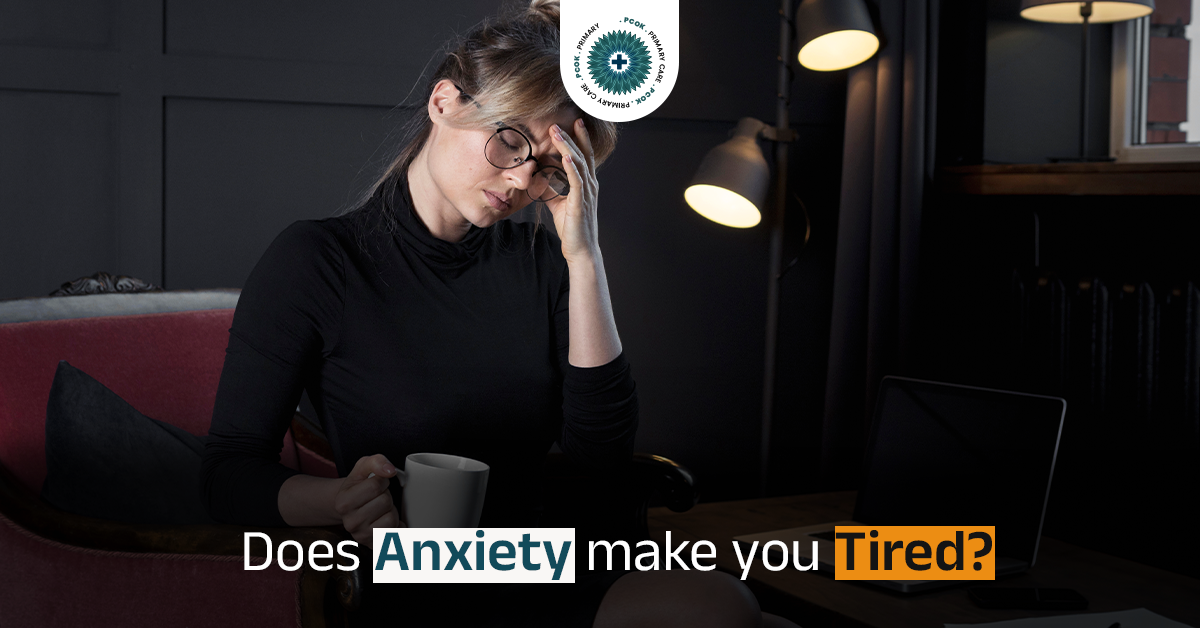Anxiety is a familiar ghost. It haunts our daily lives. It stirs up worries, igniting jitters and fears of the unknown. Does anxiety make you tired? Yes. Anxiety is the quiet saboteur, wearing you down both inside and out. Many overlook how chronic anxiety stealthily erodes health and happiness.
Let’s dive into anxiety and exhaustion. We’ll examine its impact on your body and discover ways to feel better. If you often feel drained after an anxiety attack. We’ll explain why this happens and share tips to help you recharge.
Feeling constantly drained from anxiety? At Primary Care of Kansas, we understand. We can help you regain your energy and take control of your health. Contact us today!
How Anxiety Drains Your Energy
Anxiety isn’t just a brief feeling; it acts like a full-body workout. When it hits, your brain is on high alert, working overtime. This perpetual state of stress runs your body ragged, resulting in a duel of anxiety and fatigue.
Let’s unpack how anxiety saps your energy:
- Accelerated Heart Rate: Your heart races like a runaway train. This extra effort can leave you drained.
- Muscles in Knots: Anxiety twists and tightens your muscles, creating discomfort and weariness.
- Endless Overthinking: Your thoughts race in circles, crafting a maze of mental exhaustion that makes relaxation elusive.
- Sleep Stealer: Anxiety makes sleep a challenge. It leaves you tired in the morning.
Why Does Anxiety Make You Feel Tired?
If anxiety makes you wonder, does anxiety make you feel tired? You’re not alone. Many feel fatigued from excessive worry, even on low-activity days. This tiredness comes from anxiety. It puts your body in survival mode.
Your brain floods your body with stress hormones, like cortisol and adrenaline. It keeps you hyper-aware. But prolonged exposure to these hormones can drain your energy. It can cause exhaustion after anxiety. You feel exhausted after an anxious episode.
Can Anxiety Cause Weakness and Fatigue?
Yes, does anxiety cause weakness? It is a common concern. Anxiety steals energy and acts as a silent saboteur. Prolonged stress robs your muscles of rest, making them drained and tired. This constant tension can lead to:
- Weak, shaky limbs after an anxiety attack
- Dizziness and lightheadedness due to stress hormones
- Difficulty focusing because your brain is overworked
Have you felt lightheaded after an anxiety episode? That’s your body needing a break. Anxiety causes stress and drains your energy. When stress hangs around, exhaustion sets in. Remember, rest isn’t optional.
Why Do You Feel Tired After an Anxiety Attack?
After an anxiety attack, many find themselves swimming in fatigue. This draining experience occurs when anxiety stretches your body to its limits. Your heart pumps furiously, muscles tighten like a vice, and your breath quickens. All this upheaval steals your energy, leaving you feeling spent.
When the anxiety storm passes, you feel empty. Emotionally, it’s like a mental marathon, leaving you wanting rest. Recovery is important; give your body time to recharge and heal. Rest is key to regaining your energy and balance.
How to Reduce Anxiety-Related Fatigue
Anxiety can cause fatigue. It can make daily life a struggle. But don’t fret; brighter days are ahead! Here are some tips to shake off that anxiety and fatigue:
-
Embrace Restful Slumber
Anxiety often sends sleep packing, deepening your weariness. To combat this:
- Stick to a regular sleep schedule
- Avoid caffeine before bed
- Practice deep breathing or meditation before sleeping
-
Eat a Healthy Diet
Your body needs good fuel to fight anxiety. Eat foods rich in vitamins and minerals like:
- Leafy greens
- Nuts and seeds
- Lean proteins
These foods help keep your energy levels stable and reduce anxiety and exhaustion.
-
Stay Active
Exercise reduces stress and increases energy. Activities like walking, yoga, and stretching help calm anxiety. They can lessen mentally exhausting feelings.
-
Manage Stress
Reducing stress can help prevent exhaustion after anxiety. Try:
- Deep breathing exercises
- Journaling your thoughts
- Talking to a trusted friend or therapist
-
Drink Plenty of Water
Dehydration worsens anxiety and fatigue. Drink water throughout the day. Staying hydrated fights low energy like a secret weapon!
When to Seek Help
Do you find yourself wondering, does anxiety make you tired? If your usual treatments fall flat, it’s time to consider professional support. A skilled therapist or doctor can help you manage anxiety. They can find the best treatment for you.
Consider these signs that signal a need for expert guidance:
- Your fatigue is casting shadows over daily life
- You feel strong waves of anxiety and exhaustion frequently
- Sleep eludes you, making focus a fleeting dream
While anxiety may be a common companion, it need not dictate your journey. Seeking help is a bold leap toward brighter days ahead.
Final Thoughts
Does anxiety make you tired? Yes, it does. Anxiety puts stress on both your body and mind. This can lead to feelings of fatigue. After an anxiety attack, you might feel drained. Even ongoing anxiety can leave you exhausted. In both cases, pay attention to your body and take time to recover.
You can lessen anxiety-related tiredness. Start with small lifestyle changes and relaxation techniques. If you need support, seek help. Remember, you are not alone. Many people feel anxious and tired. Luckily, there are ways to uplift your mood and energy.
When anxiety is high, focus on self-care. Small changes can lead to big improvements!
FAQs
Why do I feel tired after an anxiety attack?
After an anxiety attack, your body feels drained. Your heart races and your muscles tighten due to stress. Overthinking saps your mental energy, leaving you exhausted. A deep fatigue remains after the anxiety attack.
Can anxiety cause weakness in the body?
Yes, anxiety causes weakness, which is a common concern. Anxiety can weaken, shake, or weigh down your muscles. Stress hormones affect your nervous system.


No comment